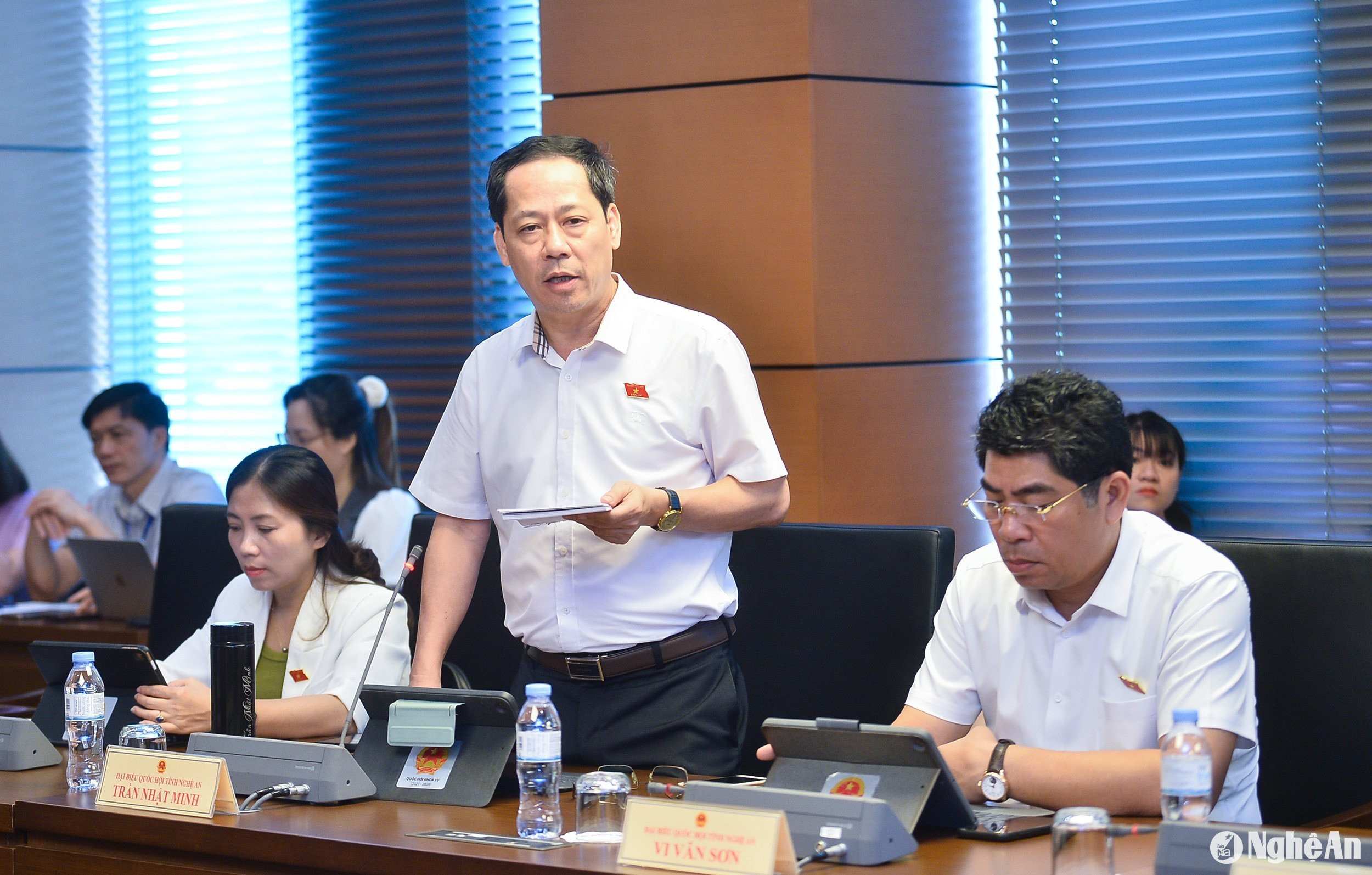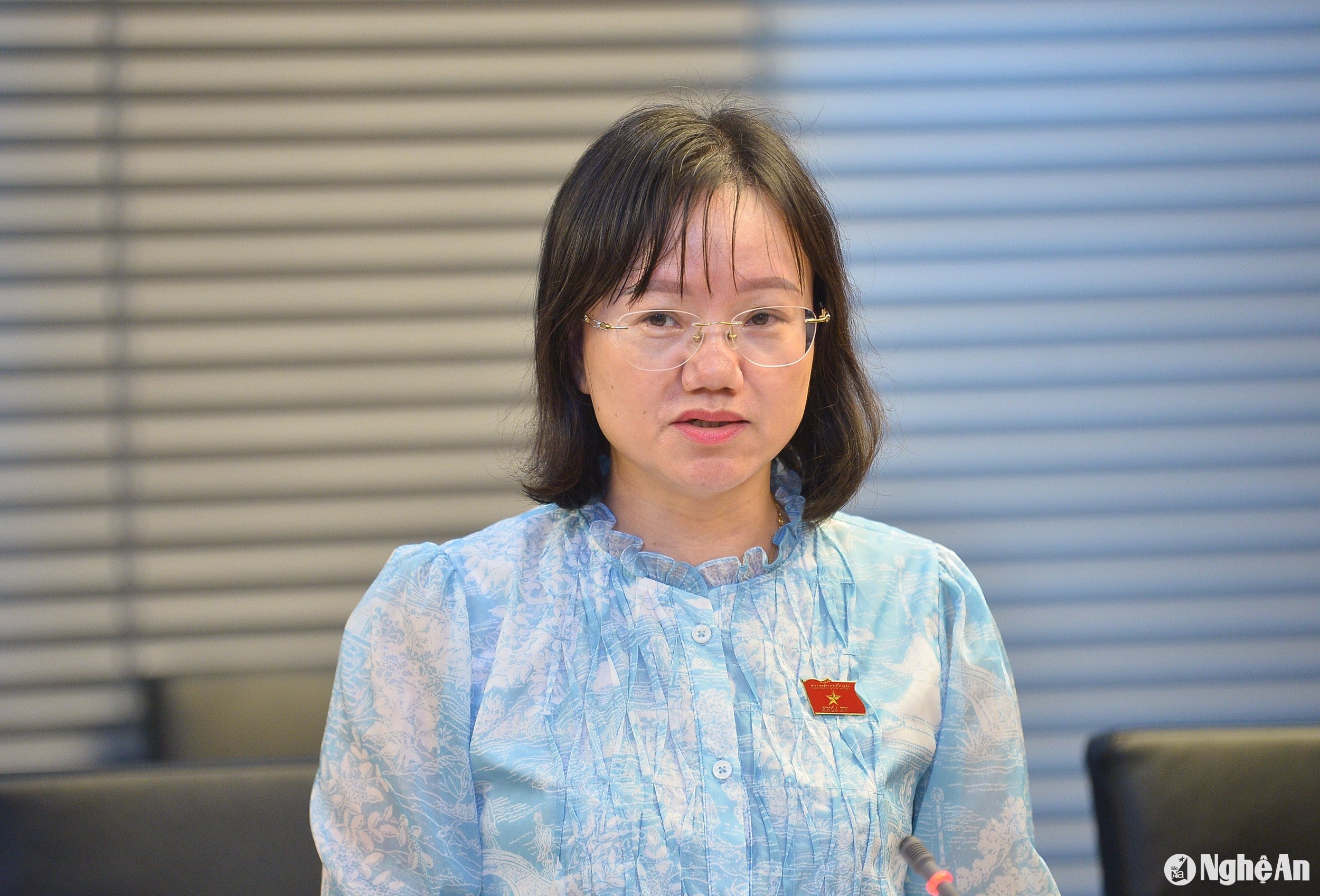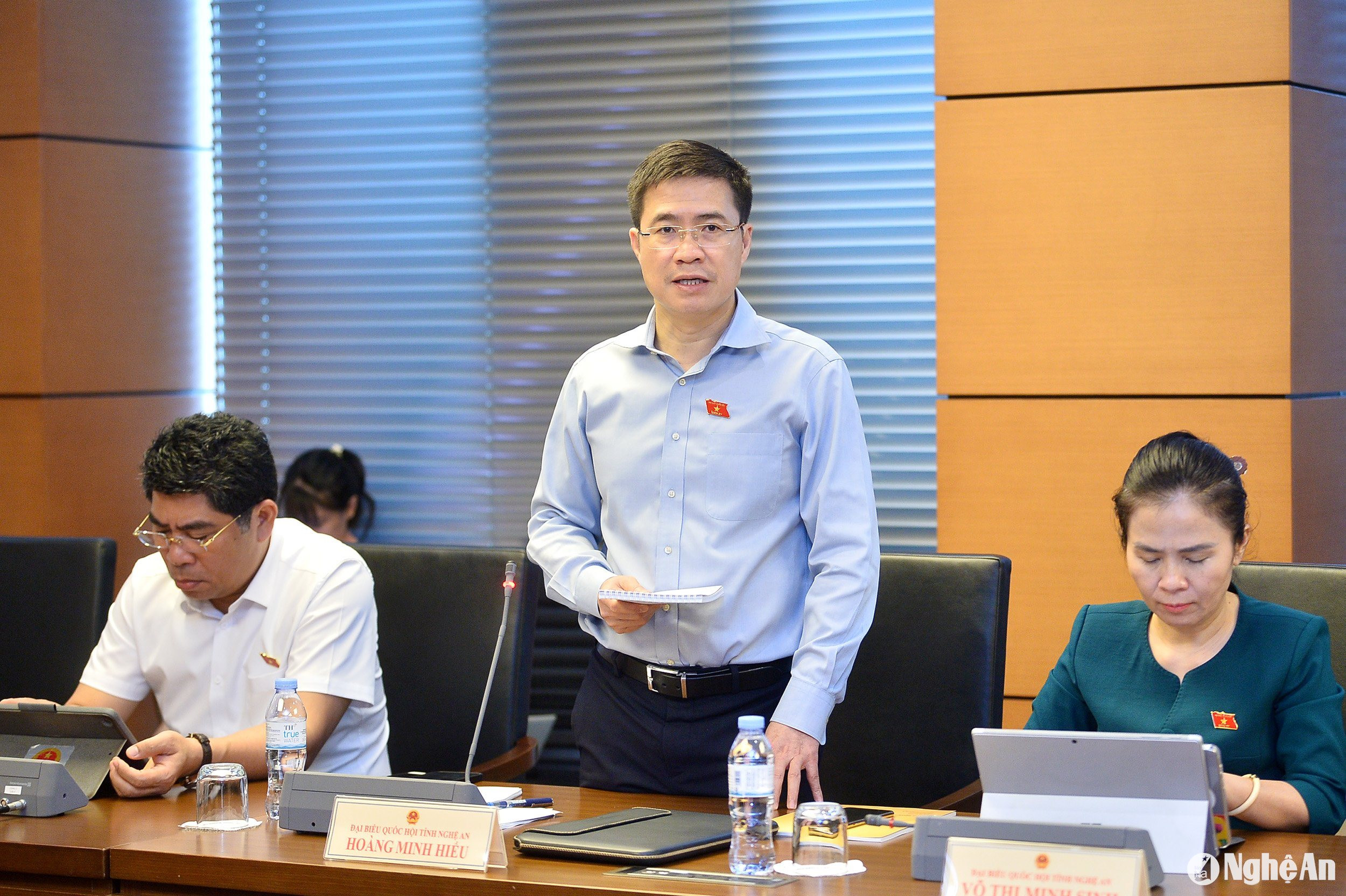National Assembly Delegation of Nghe An discussed amendments to the Law on Notarization
On the afternoon of June 17, continuing the program of the 7th session of the 15th National Assembly, the National Assembly Delegation of Nghe An province discussed in Group 3 with the National Assembly Delegation of Bac Kan province and the National Assembly Delegation of Quang Ngai province on the Draft Law on Notarization (amended), the Draft Law on Value Added Tax (amended) and the Draft Resolution of the National Assembly on reducing value added tax.
Delegates from Nghe An focused on discussing the Draft Law on Notarization (amended), in which all delegates agreed with the necessity of promulgating the amended Law to meet current socio-economic development needs.
Concerns about notarized translation regulations
One of the issues that delegates are interested in is the issue of notarization of translations. Agreeing with the draft Law stipulating that notaries are allowed to certify the translator's signature according to the provisions of the law on certification, National Assembly delegate Tran Nhat Minh said that such a provision will overcome the shortcomings and problems of the current Notarization Law that allows notaries to notarize translations.
“Because notaries cannot be fluent in many foreign languages at the same time, even ethnic minority languages, to practice their profession,” delegate Tran Nhat Minh explained.

Further supporting his opinion, delegate Minh said that if notaries are allowed to notarize translations and use a team of translators, the responsibility must be shared between the translator and the notary. This would not be consistent with the scope of the Notary Law as well as individual responsibility in notarization activities.
Furthermore, according to the provisions of law, the translator is responsible to the requesting party under the translation contract, so it is not within the scope of the Law on Notarization. Therefore, the provision in the draft law that the notary only performs the authentication of the translator's signature according to the provisions of the law on authentication is appropriate.
Regarding this issue, delegate Hoang Minh Hieu shared the concerns of delegate Tran Nhat Minh about the foreign language and ethnic minority language proficiency of notaries when notarizing translations. However, the delegate said that if notaries were not assigned to notarize the content from the original into the translation but only authenticate the signature of the translation, it would create certain legal gaps and cause disadvantages for those participating in contracts and transactions in ethnic minority and foreign languages.
In particular, in the current integration process, the need to conduct transactions and contracts in languages other than Vietnamese is increasing, so it is necessary to calculate to overcome these legal gaps.
According to the delegate of Nghe An, the notarization of translations can be performed well by notary offices if there is close coordination between the notary office and the translator so that the notarization of translations ensures trust between the parties to the transaction. Therefore, it is necessary to carefully consider the regulations on the certification of translation signatures to avoid legal gaps and create conditions for civil transactions to operate better.
Proposal to expand the scope of regulation of the draft Law into the Law on Notarization and Authentication
Deputy Head of the National Assembly Delegation of Nghe An province, Thai Thi An Chung, said that it is necessary to study and expand the scope of regulation of the draft Law into the Law on Notarization and Authentication.
According to the delegate, there was previously a document regulating general regulations on notarization and certification, but then the regulations were separated into two different documents: the Notarization Law and the Government Decree regulating certification activities.
In reality, there is a tendency to confuse notarization and authentication. Delegate Thai Thi An Chung cited the fact that currently, there are some notary organizations that still perform authentication; meanwhile, in localities where there are no notary organizations, the People's Committees at district and commune levels authenticate legal documents and civil transactions. From this reality, the delegate proposed to expand the scope of this Law to include notarization and authentication activities.

Regarding the criteria for appointing notaries, the Deputy Head of the Provincial Delegation of National Assembly Deputies agreed with the draft Law regulating the age of appointment. However, the delegate said that the draft only sets the age of appointment to no more than 70 years old, but there are no regulations related to the age of practice of notaries. The transitional provisions stipulate that notaries from 68 to 70 years old at the time this Law comes into effect can practice notary until they turn 72 years old, which means the age of practice in this case is until they turn 72 years old. Therefore, the delegate suggested that research and additional regulations clearly stipulate the age of practice of notaries.
Regarding the dossier for appointing notaries, delegate Thai Thi An Chung said that the draft Law's provision to remove 4 types of documents, including 3 types issued by the Department of Justice, is reasonable and contributes to reforming administrative procedures.
In addition, the delegate also proposed to study solutions to increase the number of notaries and notary organizations in the coming time. Explaining this opinion, the delegate cited data in the Summary Report on the implementation of the Notary Law when in 7 years only 308 notaries and 147 notary organizations increased, not meeting the requirements of current socio-economic development.
Along with that, the shortage of notary organizations will cause overload for People's Committees at all levels when they will have to certify documents, contracts, and transactions.
Proposal to supplement regulations on notarization quality control
Delegate Hoang Minh Hieu said that according to the data of a survey report conducted by the Judicial Academy in collaboration with the University of Law, Hanoi National University, if a notary works seriously and scientifically, he can only notarize 8 to 10 contracts and transactions in a day. However, in Hanoi, there are notaries who notarize up to 700 transactions in a day.

From that data, delegate Hoang Minh Hieu raised concerns about the quality of current notary activities. Along with that, delegates reflected that there are quite a lot of violations in current notary activities, especially "fake" notarization of car sales transactions or notarization without the presence of a notary.
Therefore, the draft Law needs to add solutions to control the quality of notarization such as requiring photos of transaction signing activities to keep records like bailiffs or controlling the maximum number of contracts and transactions that notaries notarize per unit of time as experienced by some countries.
It is necessary to consider regulating the organizational model of Notary Offices.
Regarding the regulations on the organizational model of Notary Offices, delegates Hoang Minh Hieu and Tran Nhat Minh agreed with the Law Committee's Review Report on the plan to regulate the types of private enterprises and partnerships applied to Notary Offices established in remote areas, areas with particularly difficult socio-economic conditions; for other areas, only the type of partnership company is applied instead of the general regulation that only the type of partnership company is applied as in the Draft.
Explaining further for this plan, delegates said that not allowing the establishment of Notary Offices in the form of private enterprises is one of the reasons leading to the current difficulty in establishing Notary Offices in areas with difficult economic and social conditions, limiting the right to access notary services of people in these areas. Meanwhile, in reality, the number of Notary Offices is only concentrated in central areas with developed economies.
Regarding the name of the Notary Office, the delegate of Nghe An Delegation said that the draft Law stipulating that the name must not be the same or confusing with the name of the notary organization operating nationwide is too broad. The delegate suggested studying the regulation in the direction of the scope of the provincial-level administrative unit for easy management and implementation.


